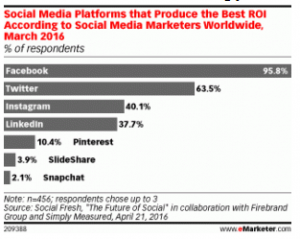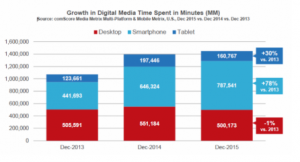Some clients look at me like I’m insane when I say they should be on Facebook. Facebook? That silly little thing my teenagers post Joe Biden pictures on? It’s more powerful than that though. If Facebook were a country, it would be the third-largest in the world. Facebook’s targeted advertisements, common use
as a directory and growing membership has given it a marketing power that a social media platform has never before had. Here are a few reasons why business owners should be taking Facebook seriously.
1. Builds brand loyalty
Everyone wants to be on a first-name basis with people who provide the business services and products. It’s human nature; people are more likely to do business with other people they know and like. Facebook allows business owners to become more personal with their consumers by providing the opportunity for them to create and maintain active and engaging business pages. Facebook fans who like your page are also more likely to recommend you to their family and friends. In reverse, be careful about starting a page and forgetting it. Because Facebook is designed to be helpful for its members, I’ve seen a forgotten and empty business page with Facebook’s suggestions of more active pages to visit. Those suggestions turned out to be the competitors of the business that I originally searched for. You don’t want to build loyalty for your competitors.
2. Has the best ROI of all the online social platforms
 Marketers were polled on which of the top social platforms contributed most significantly to their ROI. Facebook won overwhelmingly. Because Facebook has a huge potential to provide a significant return on that initial investment, foregoing a business page could mean throwing away potential dollars. Here’s how to calculate the math, according to social media content management platform, Hootsuite:
Marketers were polled on which of the top social platforms contributed most significantly to their ROI. Facebook won overwhelmingly. Because Facebook has a huge potential to provide a significant return on that initial investment, foregoing a business page could mean throwing away potential dollars. Here’s how to calculate the math, according to social media content management platform, Hootsuite:
Social media ROI = (SM return – SM investment) / SM investment percent.
Another helpful tip on increasing Facebook ROI is to pay close attention to the content you post. Whether it’s an ad or a video, its likes, shares, views, reactions and comments are great indicators as to whether your campaigns are working. That extra qualitative analysis can increase future Facebook ROI.
3. Increases website traffic
Everyone can post a Facebook status. That’s not where the magic happens. The strategic marketer posts statuses that link to their websites and/or landing pages. Most website analytics show that the biggest website referrer is most often Facebook. Website traffic is important because it generates conversion, which generates profit. Site views increase the bottom line, which is why we are all here, right? Here’s a guide that explains how to put traffic into a monetary value.
4. Provides mobile readiness
Facebook has increasingly become more mobile. In today’s fast-paced society, it’s important for your information to be accessible on the go. Facebook realizes most of its audience visits from mobile devices, so it has capitalized on its directory opportunity. When consumers view your business on mobile, they immediately see important information like, hours of operation, address, reviews and your phone number that they can call directly from their Facebook app. It’s another way to get consumers to your business; why would you want to miss out on that?
5. Boosts search engine optimization
Ok, there’s been some debate on this. Google once said that social currency (Facebook fans, followers, etc) had an impact on search engine optimization (SEO). Recently, Google professional Matt Cutts stated that the search engine does not factor in social media accounts in its search results ranking. Despite this, it’s important not to discount Facebook’s indirect effects on search engine results. For example, Facebook and other social outlets provide your company with more search listings on Google, Bing and Yahoo. More listings mean more ways for consumers to find you. Links are also something to keep in mind. The more links your site has, the more credibility it has; that has always been a factor in SEO. It’s also important to note that links can contribute to your search results listings, too.
When we think “SEO,” we usually think of the three big search engines, but they aren’t the only search result providers in the game anymore. Consumers increasingly search on Facebook. In 2012, Facebook was at a billion search inquiries a day! Technology changes so fast that it would be foolish not to consider social media outlets to be the search engines of the near future.
Keep in mind that Google changes the way it ranks sites often. Social currency could be a determining piece to the SEO puzzle again in the future. Also, don’t forget about Bing. Marketers get really caught up on what Google deems important because Google is so relevant, but many internet users search on Bing too. Bing has stated that social currency is a factor in its ranking process.
6. Allows businesses to nurture consumers through the sales funnel
Traditionally, Facebook has been at the top of the sales funnel. Marketers know that to create brand awareness, Facebook is key. Personally, I picture the top of the sales funnel as a huge and necessary business event. All of your competitors are at this event where they are getting leads and ultimately pushing those leads through the funnel. Would you just not show up to an event with that much potential? Not showing up probably isn’t an option for you.
With Facebook’s growing technology, businesses have access to daily consumer engagement, which builds loyalty (as we’ve discussed), ads and content that influence buyer decisions and the ability to post strong calls to action that produce sales. It’s not only an awareness game anymore; the entire marketing funnel is here. Show up to this event; your competitors are already there.
7. Does a lot of good for business reviews and testimonials
Finally, Facebook provides a space for a lot of consumer feedback. Many companies use Facebook to collect reviews to post on their sites, to pin to their actual Facebook pages or to use for their branded print material. Brands don’t have to annoy their consumers with all of those physical “how are we doing?” surveys anymore. It’s all online, and an easily accessible resource for future buyers.
Facebook reviews also provide a way to push down negative reviews. So many business owners have those daunting old reviews that just will not leave from the first results page. As previously discussed, social media gives you more listings. More relevant listings mean fewer bad reviews on the first page.
In conclusion, Facebook has the potential to get your business out to your consumers. Today, Facebook is more than just a way to keep up with your high school classmates. Thank goodness.



